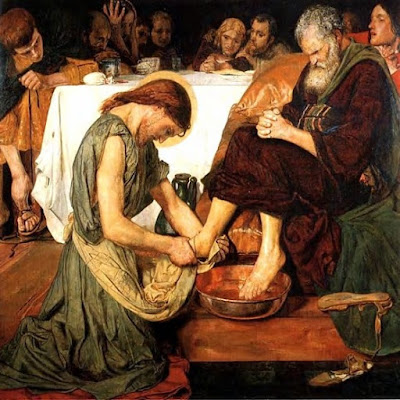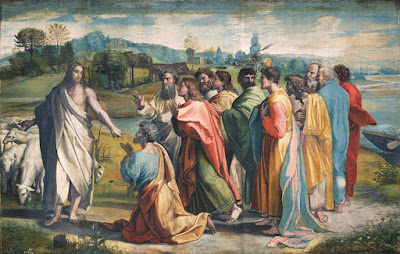Sunday, 24 April 2016
Evangelium Conference
Registration is open for the ninth Evangelium weekend residential conference on the theme of explaining the Catholic faith in the modern world, 29 – 31 July 2016.
Set in the beautiful grounds of the Oratory School in Reading, the acclaimed Evangelium Conference combines a unique weekend break with the opportunity to learn more about the Catholic faith, assisting participants to live, share, and defend the faith today. Talks and workshops are combined with daily Mass, Eucharistic adoration, and social events. The conference is intended especially for young Catholics age 18 – 35.
For more details, and to book please visit the Evangelium website
Fifth Sunday of Easter
Christ washing Peter's feet, Ford Maddox Brown
“I give you a new commandment: love one another.
As I have loved you,
so you also should love one another.”
The community of disciples that Jesus has formed and is forming, which can also be called “the Church” and “the Kingdom,” should be marked by this love:
“This is how all will know that you are my disciples,
if you have love for
one another.”
Icon of the Last Supper
Is our local parish a community of love, or a religious centre where people greet each other in passing while heading in or out of worship? Is it any wonder, then, that the world doesn’t recognize us as the disciples of Jesus?
It is a hard saying. We have a great deal to do in order to implement our Lord’s command this day.
The latest version of our newsletter can be found here.
Sunday, 17 April 2016
Fourth Sunday of Easter
Good Shepherd Sunday
"Jesus said: ‘The sheep that belong to me listen to my voice; I know them and they follow me.’" Christ Himself is the Good Shepherd, who knows each one of His sheep, who gives His life for them and snatches them from the jaws of the marauding wolf. He is the true shepherd who fulfils Ezekiel's prophecy foretelling for Israel a shepherd from the end of time who was to deliver his people.Christ's sheepfold is the Church. In the Church He bestows on us His life in the Sacraments, His word in the teaching that she gives us, all the riches of His grace to light up our way and uphold our steps as we go forward to our heavenly home; through her He acts as the one Shepherd of our souls. Appointed to lead the flock, Peter gave his life for those entrusted to his care, and ever since then the priestly ministry has assured the continuous presence in the Church of Him who remains the true Shepherd of our souls.
Mosaic from the Mausoleum of Galla Placidia, Ravenna
The latest version of our newsletter can be found here.
Monday, 11 April 2016
Calendar of Events
We are offering a number of events in the coming months of this year of mercy. An elegant, printable, version of this calendar may be found here. A list of the most imminent of these events will appear in the left hand side-bar (non-mobile version).
8th May: Feast of the Ascension
15th May: Feast of Pentecost
22nd May: Feast of the Most Holy Trinity, followed by Brunch
29th May: Feast of Corpus Christi
9th July: Group Pilgrimage to Arundel
15th August: Assumption of the B.V.M.
18th September: 25th Sunday in Ordinary Time, followed by Brunch
8th October: National Ordinariate Pilgrimage to Birmingham
28th-30th October: Reading Ordinariate Weekend Pilgrimage to Walsingham
27th November: First Sunday of Advent
Saturday, 9 April 2016
Third Sunday of Easter
'Christ's charge to Peter' (Raphael)
There are two places in Scripture where the curious detail of a “charcoal fire” is mentioned. One is in today’s Gospel, where the Apostles return from fishing to find bread and fish warming on the fire. The other is in the scene in the High Priest’s courtyard on Holy Thursday, where Peter and some guards and slaves warm themselves while Jesus is being interrogated inside (see John 18:18). At the first fire, Peter denied knowing Jesus three times, as Jesus had predicted (see John 13:38; 18:15-18, 25-27).
The Denial of Peter (Carl Heinrich Bloch, 1873)
Today’s charcoal fire becomes the scene of Peter’s repentance, as three times Jesus asks him to make a profession of love. Jesus’ thrice repeated command “Feed My sheep” shows that Peter is being appointed as the Shepherd of the Lord’s entire flock, the head of his Church (see also Luke 22:32). Jesus’ question: “Do you love me more than these?” is a pointed reminder of Peter’s pledge to lay down his life for Jesus, even if the other Apostles might weaken (see John 13:37; Matthew 26:33; Luke 22:33).
Jesus then explains just what Peter’s love and leadership will require, foretelling Peter’s death by crucifixion (“you will stretch out your hands”). Before his own death, Jesus had warned the Apostles that they would be hated as he was hated, that they would suffer as he suffered (see Matthew 10:16-19,22; John 15:18-20; 16:2).
The Crucifixion of Saint Peter (Ventura Salimbeni)
In Greek there are several different words translated by the one English word love. C.S. Lewis wrote wittily about them in “The Four Loves”. There is Storgé (affection) the quiet liking you might have for a neighbour who is agreeable and with whom you occasionally share a pleasantry. There is eros, a sensual or erotic love, the kind of love that can bond a couple along with their friendship and often leads to marriage. Then there is philia, meaning friendship, the admiring companionship we feel toward people with whom we share some significant interests. Finally there is agapé, which is largely generous and self-giving love, even when there is nothing tangible to be gained. (These are just generalised definitions and are not verified in every case for each of these terms). Like Peter, God wants us to love him. Can we do that in the sense of agape love – unselfish, all-giving? It is tough but we must work at truly loving God.
As usual our latest Newsletter can be found by following the link the left-hand sidebar, or here.
Subscribe to:
Comments (Atom)







